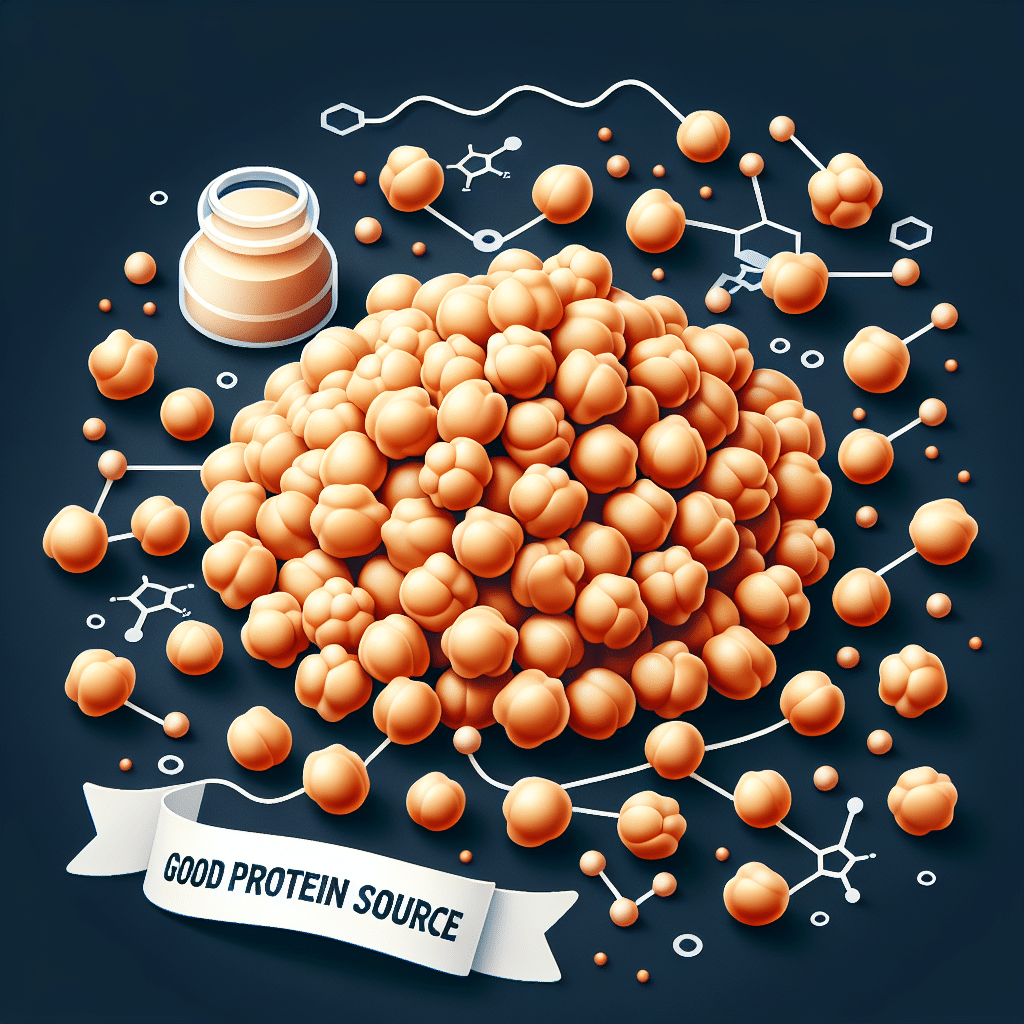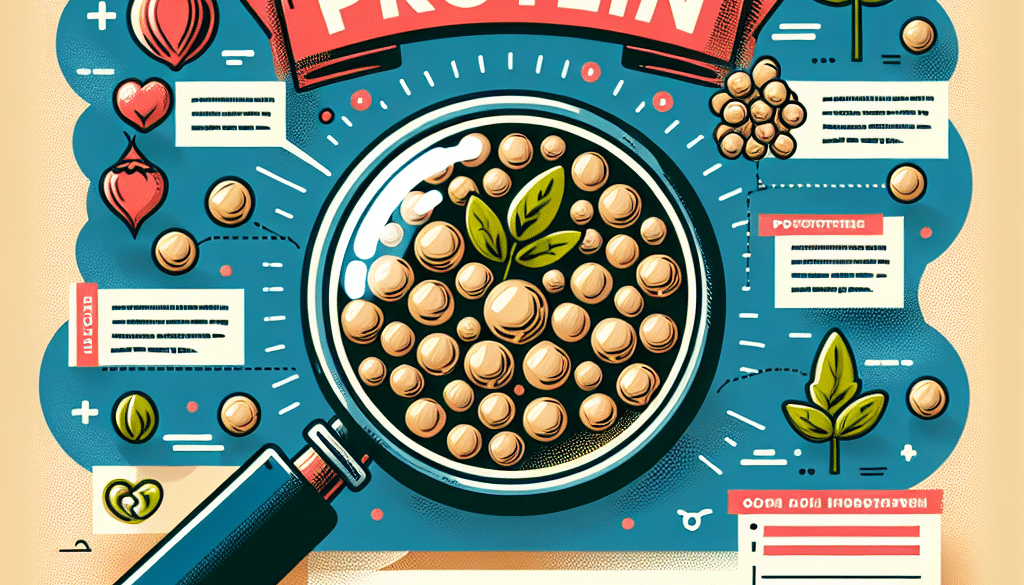Are Chickpeas Good Source Of Protein?
-
Table of Contents
- Chickpeas as a Protein Powerhouse: A Comprehensive Analysis
- Understanding Protein in Chickpeas
- Nutritional Breakdown of Chickpeas
- Comparative Protein Quality
- Health Benefits of Chickpea Protein
- Digestive Health and Weight Management
- Chronic Disease Prevention
- Incorporating Chickpeas into Your Diet
- Case Studies and Research on Chickpea Protein
- Challenges and Considerations
- Conclusion: The Protein Potential of Chickpeas
- Discover ETprotein’s Plant-Based Protein Products
Chickpeas as a Protein Powerhouse: A Comprehensive Analysis

Protein is a vital macronutrient essential for the growth, repair, and maintenance of all body tissues. With the increasing popularity of plant-based diets, many people are turning to legumes as a primary protein source. Among these, chickpeas have emerged as a favorite due to their versatility and nutritional profile. This article delves into the question: Are chickpeas a good source of protein?
Understanding Protein in Chickpeas
Chickpeas, also known as garbanzo beans, are a type of legume that has been cultivated for thousands of years. They are a staple in many cuisines around the world, particularly in the Mediterranean and Middle Eastern regions. Chickpeas are not only rich in protein but also contain a variety of other nutrients that contribute to a healthy diet.
Nutritional Breakdown of Chickpeas
One cup of cooked chickpeas contains approximately:
- 14.5 grams of protein
- 45 grams of carbohydrates
- 12.5 grams of dietary fiber
- 4 grams of fat
- 269 calories
This nutritional profile makes chickpeas an excellent source of protein, especially for those following a vegetarian or vegan diet. The protein in chickpeas is considered to be of high quality, containing essential amino acids, although it is slightly lower in methionine compared to animal proteins.
Comparative Protein Quality
When comparing chickpeas to other protein sources, it’s important to consider the concept of protein quality. Animal proteins are complete proteins, meaning they contain all nine essential amino acids in the right proportions. Plant proteins, on the other hand, often lack one or more of these amino acids.
However, chickpeas are relatively close to being a complete protein. They can be paired with other plant-based foods, such as whole grains, to create a complete protein profile. This is particularly beneficial for those who rely solely on plant-based sources for their protein intake.
Health Benefits of Chickpea Protein
Chickpeas offer numerous health benefits beyond their protein content. They are associated with improved digestion, weight management, and reduced risk of several chronic diseases.
Digestive Health and Weight Management
The high fiber content in chickpeas helps promote a healthy digestive system by preventing constipation and supporting beneficial gut bacteria. Fiber also contributes to satiety, which can aid in weight management by reducing overall calorie intake.
Chronic Disease Prevention
Studies have shown that regular consumption of chickpeas can lower the risk of heart disease, type 2 diabetes, and certain types of cancer. This is attributed to their high fiber, protein, and nutrient content, including important vitamins and minerals such as folate, iron, and magnesium.
Incorporating Chickpeas into Your Diet
Chickpeas are incredibly versatile and can be included in a variety of dishes. Here are some ideas for incorporating chickpeas into your meals:
- As a base for hummus and other spreads
- In salads and grain bowls
- As a meat substitute in tacos, stews, and curries
- Roasted as a crunchy snack
- In soups and chili
- As a flour alternative in baking
With their nutty taste and satisfying texture, chickpeas can enhance the flavor and nutritional value of many recipes.
Case Studies and Research on Chickpea Protein
Several studies have highlighted the benefits of chickpea consumption. For instance, a study published in the “American Journal of Clinical Nutrition” found that chickpea consumption could improve cholesterol levels and reduce the risk of heart disease. Another study in the “Journal of Food Science and Technology” suggested that chickpea protein could be effectively used to enrich bread and improve its protein content.
Challenges and Considerations
While chickpeas are a great source of protein, there are some considerations to keep in mind. Individuals with certain health conditions, such as gout, may need to limit their intake of chickpeas due to their purine content. Additionally, some people may experience digestive discomfort from the oligosaccharides found in chickpeas, although this can often be mitigated by proper preparation and cooking techniques.
Conclusion: The Protein Potential of Chickpeas
In conclusion, chickpeas are indeed a good source of protein, particularly for those following a plant-based diet. They offer a range of health benefits and can be easily incorporated into various dishes. When consumed as part of a balanced diet that includes a variety of protein sources, chickpeas can contribute significantly to one’s daily protein needs.
Discover ETprotein’s Plant-Based Protein Products
If you’re looking to supplement your diet with high-quality plant-based proteins, consider exploring ETprotein’s product range. ETprotein is a trusted manufacturer and supplier of organic bulk vegan proteins, including pea protein, rice protein, and various seed proteins. Their products are non-GMO, allergen-free, and feature a neutral taste, making them an excellent addition to any diet.
ETprotein’s offerings cater to a wide range of industries, from nutraceuticals to food and beverage. With a commitment to quality and customer satisfaction, ETprotein is an ideal partner for those seeking to enhance their protein intake with plant-based options.
About ETprotein:
ETprotein, a reputable protein and L-(+)-Ergothioneine (EGT) Chinese factory manufacturer and supplier, is renowned for producing, stocking, exporting, and delivering the highest quality organic bulk vegan proteins and L-(+)-Ergothioneine. They include Organic rice protein, clear rice protein, pea protein, clear pea protein, watermelon seed protein, pumpkin seed protein, sunflower seed protein, mung bean protein, peanut protein, and L-(+)-Ergothioneine EGT Pharmaceutical grade, L-(+)-Ergothioneine EGT food grade, L-(+)-Ergothioneine EGT cosmetic grade, L-(+)-Ergothioneine EGT reference grade and L-(+)-Ergothioneine EGT standard. Their offerings, characterized by a neutral taste, non-GMO, allergen-free attributes, with L-(+)-Ergothioneine purity over 98%, 99%, cater to a diverse range of industries. They serve nutraceutical, pharmaceutical, cosmeceutical, veterinary, as well as food and beverage finished product distributors, traders, and manufacturers across Europe, USA, Canada, Australia, Thailand, Japan, Korea, Brazil, and Chile, among others.
ETprotein specialization includes exporting and delivering tailor-made protein powder and finished nutritional supplements. Their extensive product range covers sectors like Food and Beverage, Sports Nutrition, Weight Management, Dietary Supplements, Health and Wellness Products, and Infant Formula, ensuring comprehensive solutions to meet all your protein needs.
As a trusted company by leading global food and beverage brands and Fortune 500 companies, ETprotein reinforces China’s reputation in the global arena. For more information or to sample their products, please contact them and email sales(at)ETprotein.com today.












